John Carpenter’s They Live (1988).
Read. Obey. Watch.
*** SPOILER ALERT ***
Director John Carpenter had a string of hits during what could be argued as being the peak of his career between 1978’s seminal slasher, Halloween (still one of the most profitable films ever made) and 1986’s Big Trouble In Little China (a theatrical flop but a huge success on home video). Either side of this period he’d also made smaller but equally memorable films such as 1976’s Assault On Precinct 13. Yet it seems that over the course of his career, for every hit Carpenter had, he’d make a flop, be that critical, commercial or sometimes both. Even the film that many consider to be Carpenter’s best film, 1982’s The Thing, was a flop upon initial release. Few would argue against the director’s cult status but his career seems to have petered out somewhat after a less than stellar run of flops throughout the ‘90s.
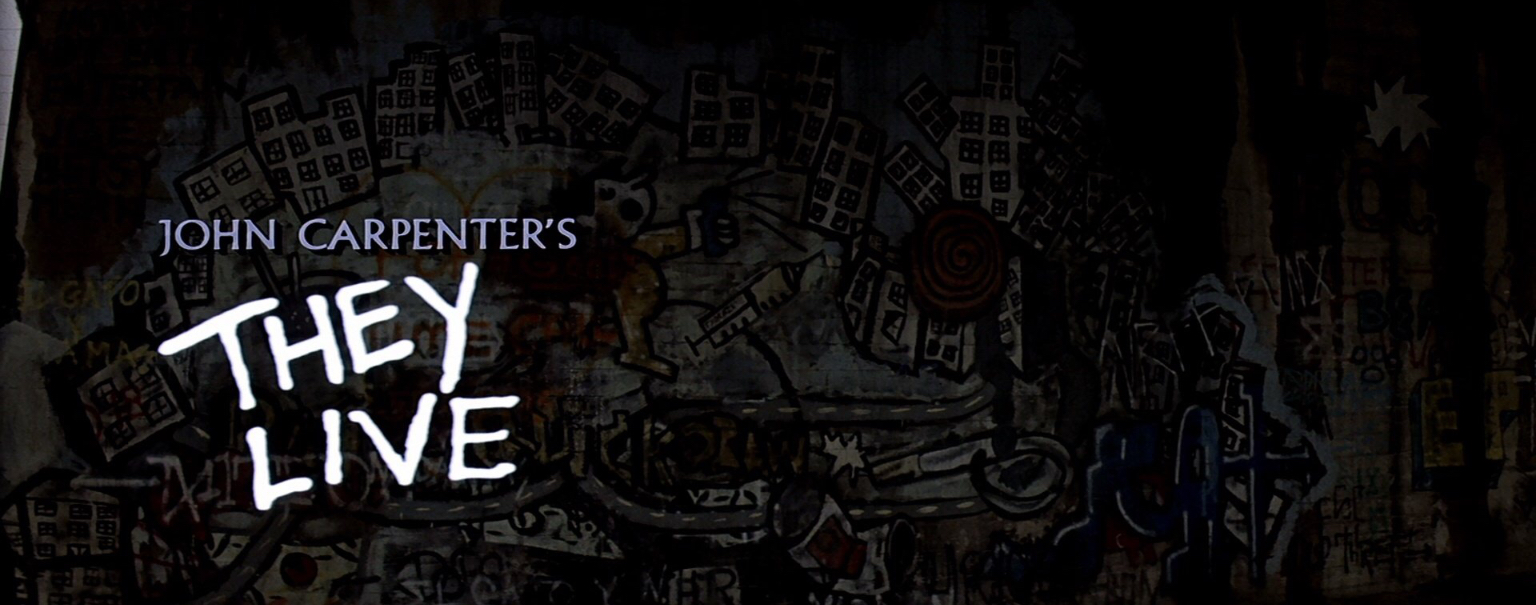 Yet Carpenter’s filmography contains numerous gems that are ripe for discovery and one such gem is They Live, his low budget 1988 adaptation of Ray Nelson’s 1963 short story 8 O’Clock in the Morning. Whether due to the studio’s acknowledgment of Carpenter’s creative skills as a filmmaker, and also the less than stellar success of some of his previous films, he was given final cut on the film but the price he paid for greater creative control was a restricted budget of only $4 million.
Yet Carpenter’s filmography contains numerous gems that are ripe for discovery and one such gem is They Live, his low budget 1988 adaptation of Ray Nelson’s 1963 short story 8 O’Clock in the Morning. Whether due to the studio’s acknowledgment of Carpenter’s creative skills as a filmmaker, and also the less than stellar success of some of his previous films, he was given final cut on the film but the price he paid for greater creative control was a restricted budget of only $4 million.
For the main character, John Nada (which translates as “nothing” in Spanish) Carpenter took something of a risk and cast a WWF (now WWE) wrestling legend, the late, great “Rowdy” Roddy Piper after seeing him in 1987’s WrestleMania III. Keith David who had starred in Carpenter’s The Thing would play Frank, a fellow construction worker who Nada befriends.
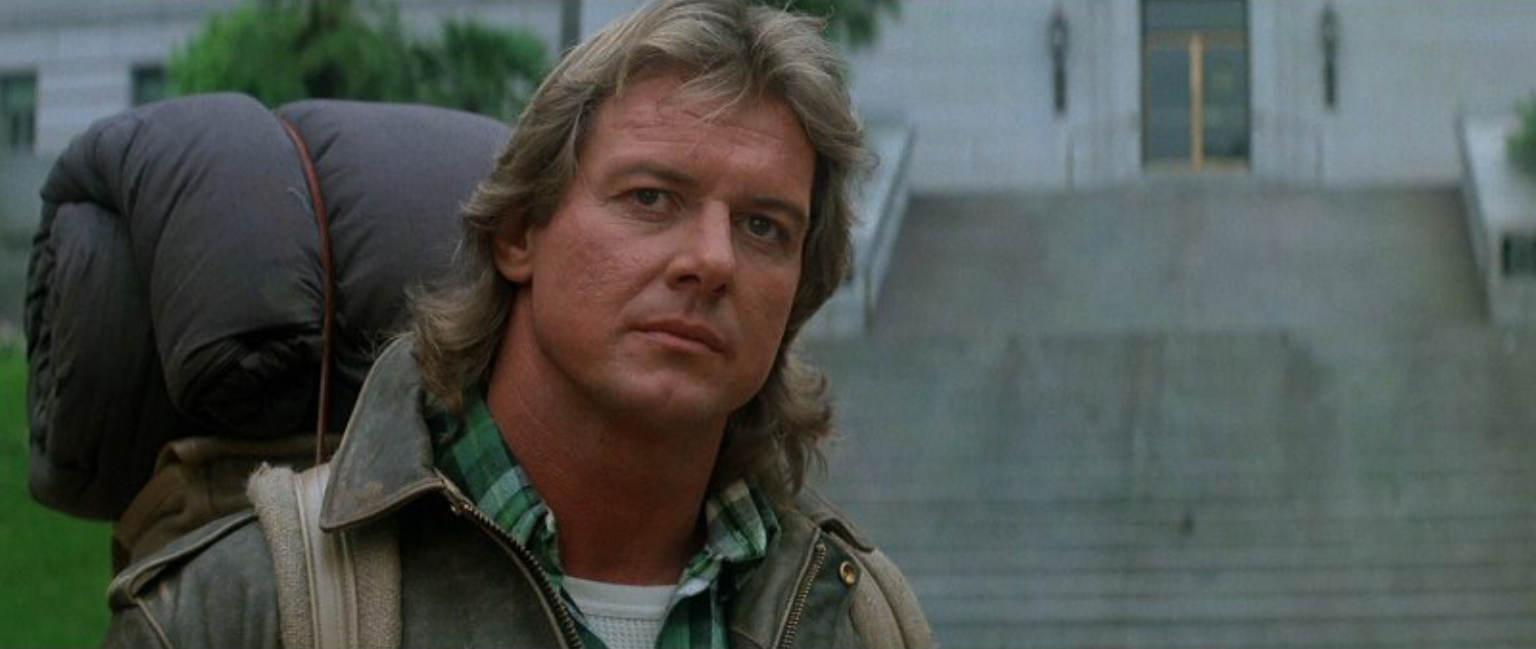
They Live is, on the surface, a science fiction thriller but just below this thin veneer lies a film brimming with overt satire on the excessive consumerism which defined Reagan-era America. Nada plays a drifter moving from city to city looking for construction work and the opening act of the film has a pleasingly sedate pace where we are allowed to soak in the atmosphere of Downtown Los Angeles. Having not seen the film for decades and recently rewatching it for the purposes of this review, I was impressed by how much restraint Carpenter shows and how he puts so much emphasis on setting the scene in the opening act. It’s not that we get to learn that much about Nada but we get a definite vibe as to the social turmoil and high unemployment that is rife, something which later proves to be integral to the plot.
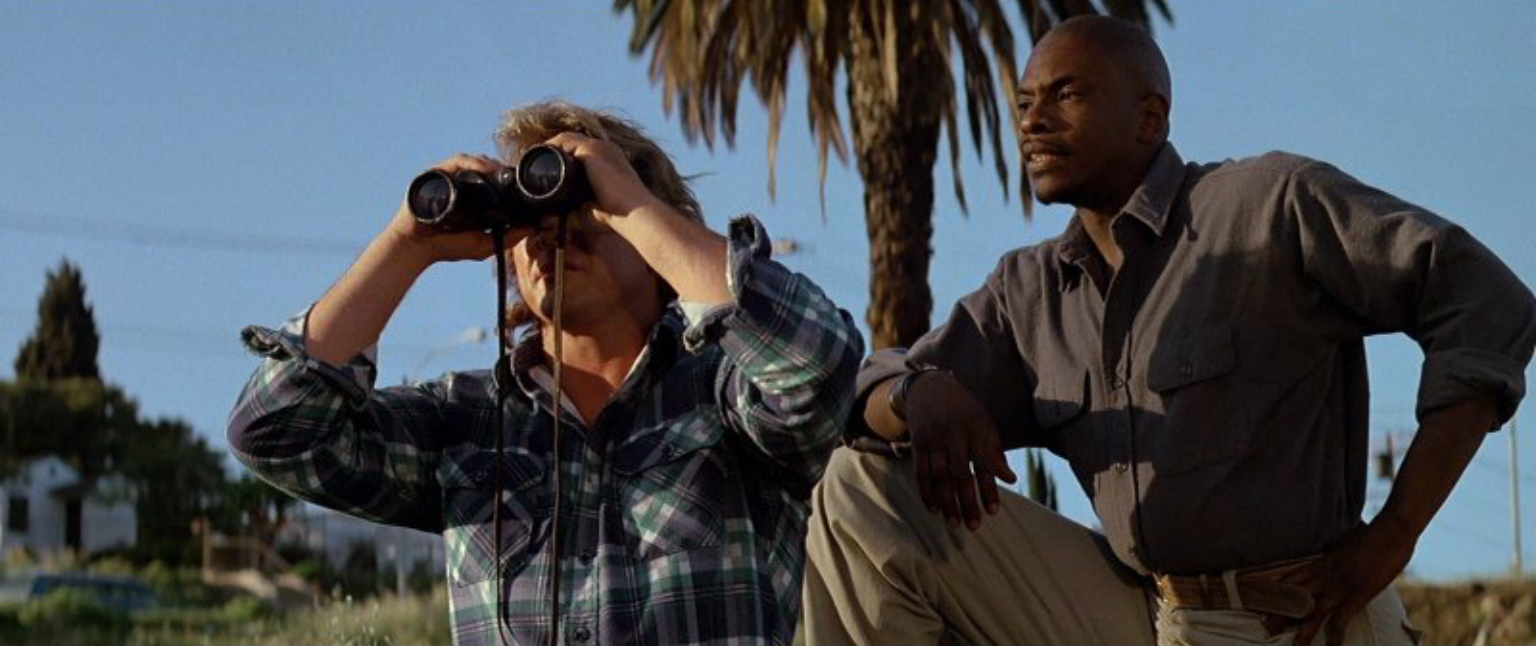
Nada discovers what at first seems to be a secret underground movement whose aim is unclear, but after he witnesses a brutal police raid on said group, he returns to their trashed base of operations and retrieves an innocuous box of sunglasses. He stashes the box and takes a pair with him. When he puts them on he is stunned to find that whilst the glasses filter out colour, they also show the world as it truly is – inhabited by gruesome looking aliens who are controlling humanity by way of subliminal messages. The glasses show that all forms of advertising and literature are actually strong messages of control such as “OBEY”, “CONSUME”, “CONFORM”, their true appearance masked by a signal broadcast by the aliens. Their aim is to breed poverty and unemployment and feed off society by infiltrating and occupying it’s upper echelons. There are clues to this revelation early on, in particular the ramblings of a blind street preacher but Piper plays the eventual shock realisation well.
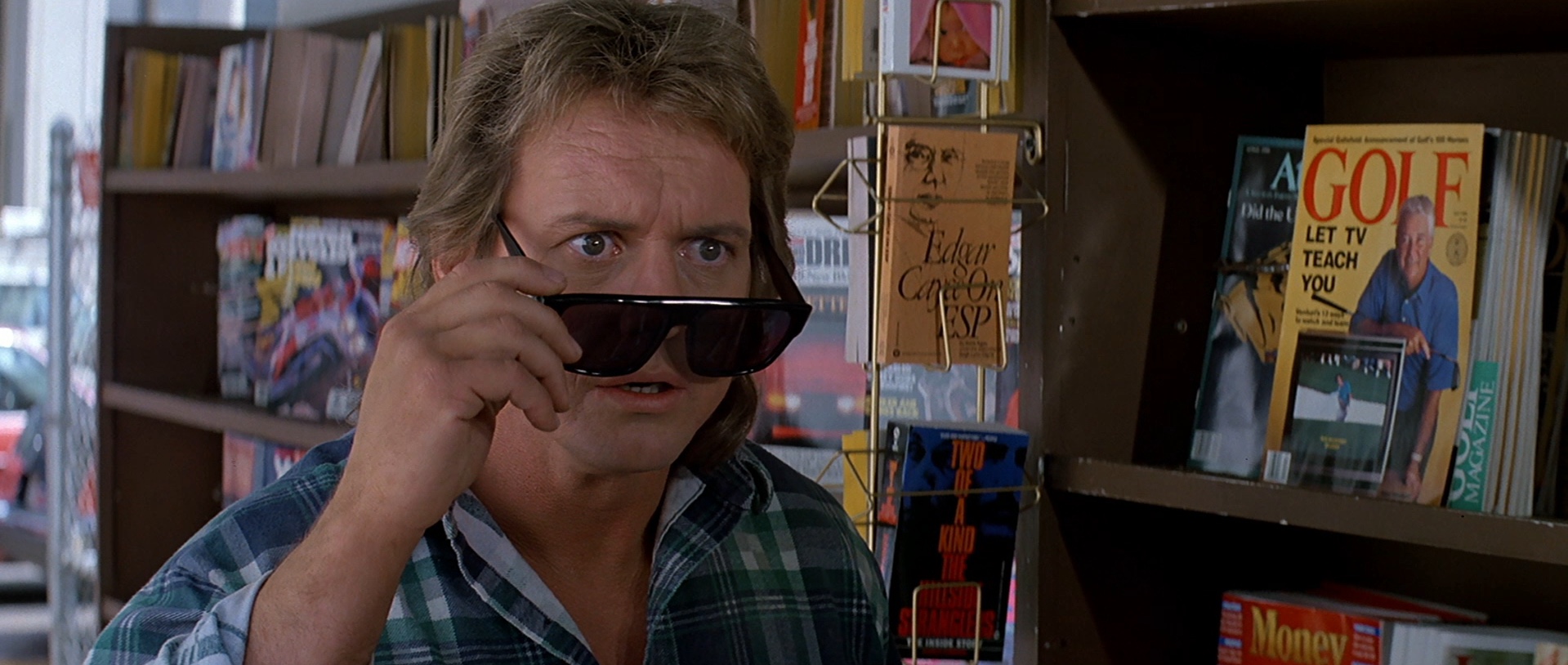
The cinematography by Gary B. Kibbe, who worked on Carpenter’s two previous films, Prince of Darkness and Big Trouble In Little China, makes the most of the L.A. locations and is generally pleasing on the eye, especially in the atmospheric first act. One aspect of the film that I did find rather mundane was the score. Carpenter is renowned for scoring several of his own films and here, along with Alan Howarth, his bluesy, synthesised score is similar to some of his past works but in this case is very repetitive with very little variation and overall I feel that it adds very little to the film.
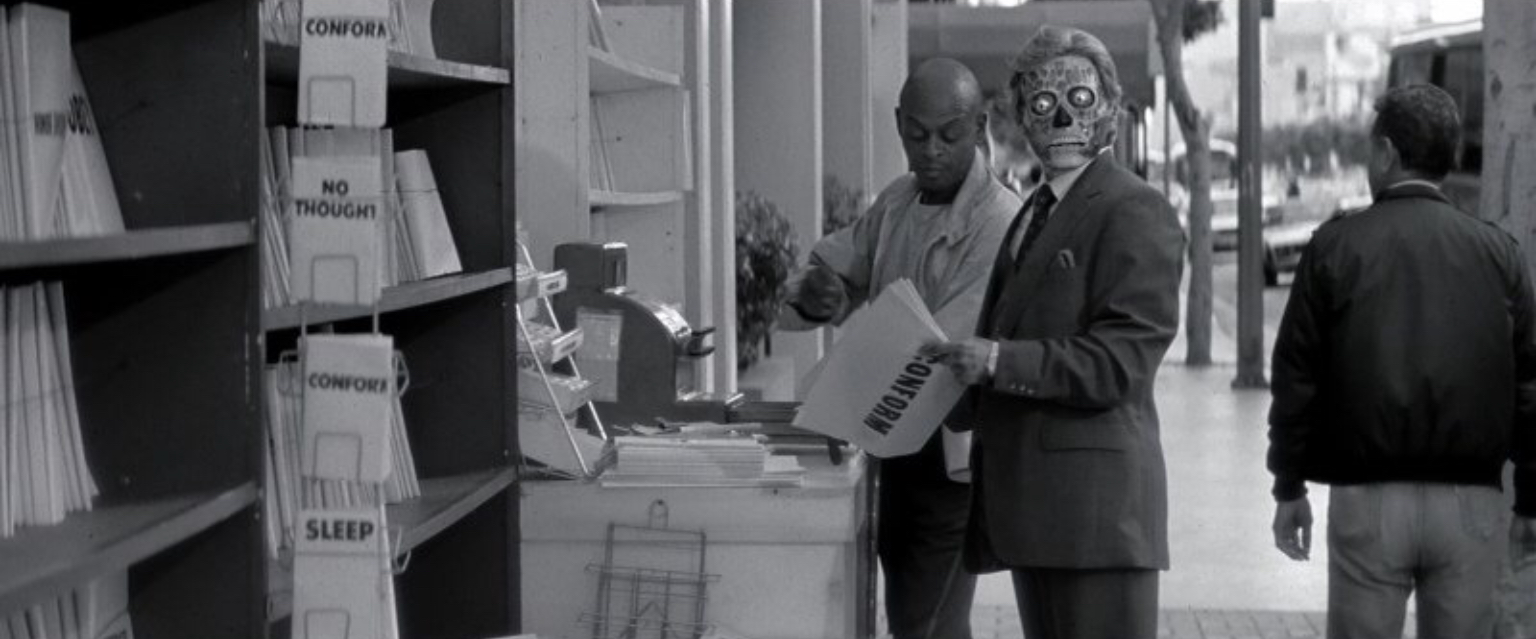
Whilst They Live is well lensed it has an almost intentionally grungy, low budget feel to it. The performances could never be called Oscar worthy. Piper has a strong physical presence but some of his delivery is a little staid and much of the dialogue is befitting of a B-movie but given his background as a sports entertainer (wrestler) he does far better than one might expect. However, he must be given credit for the standout scene where after acquiring some guns and evading the police, he finds himself in a crowded bank adorned with his glasses that show half the customers in their true form. Those familiar with the now famous bubblegum line will know the scene well, but for those who don’t, this brilliant quip has to rank as one of the most satisfyingly effective one-liners in film and it was Piper himself who came up with it, taken from his own book of wrestling smack-talk notes that he’d compiled. Keith David, a more seasoned character actor, is on fine form but his is the only really praiseworthy performance other than Piper’s.

Aside from the surprise revelation, They Live’s plot is fairly straightforward but what makes it memorable is the unique approach, daring casting and the fact that Carpenter was not bound by the usually strict confines of studio control who were happy to give him a minimal budget and just let him get on with it. The action scenes aren’t particularly well choreographed, especially the gunplay towards the end which is rather repetitive and lacks imagination. That said the film does feature a fight scene between Nada and Frank that must surely rank amongst the best fights in movie history. It’s not that it’s convincingly choreographed because on the whole it isn’t. What it is is laughably long, just when you think it’s over, the floored pugilist gets back up for more and this goes on seemingly for an age (the fight is actually 5 minutes 20 seconds but feels much longer). There’s an air of comedic hyperbole to the fight and it fits in perfectly with the tone of the film. They Live takes itself very seriously but lurking just below the surface is a knowingly wry sense of humour and parody.
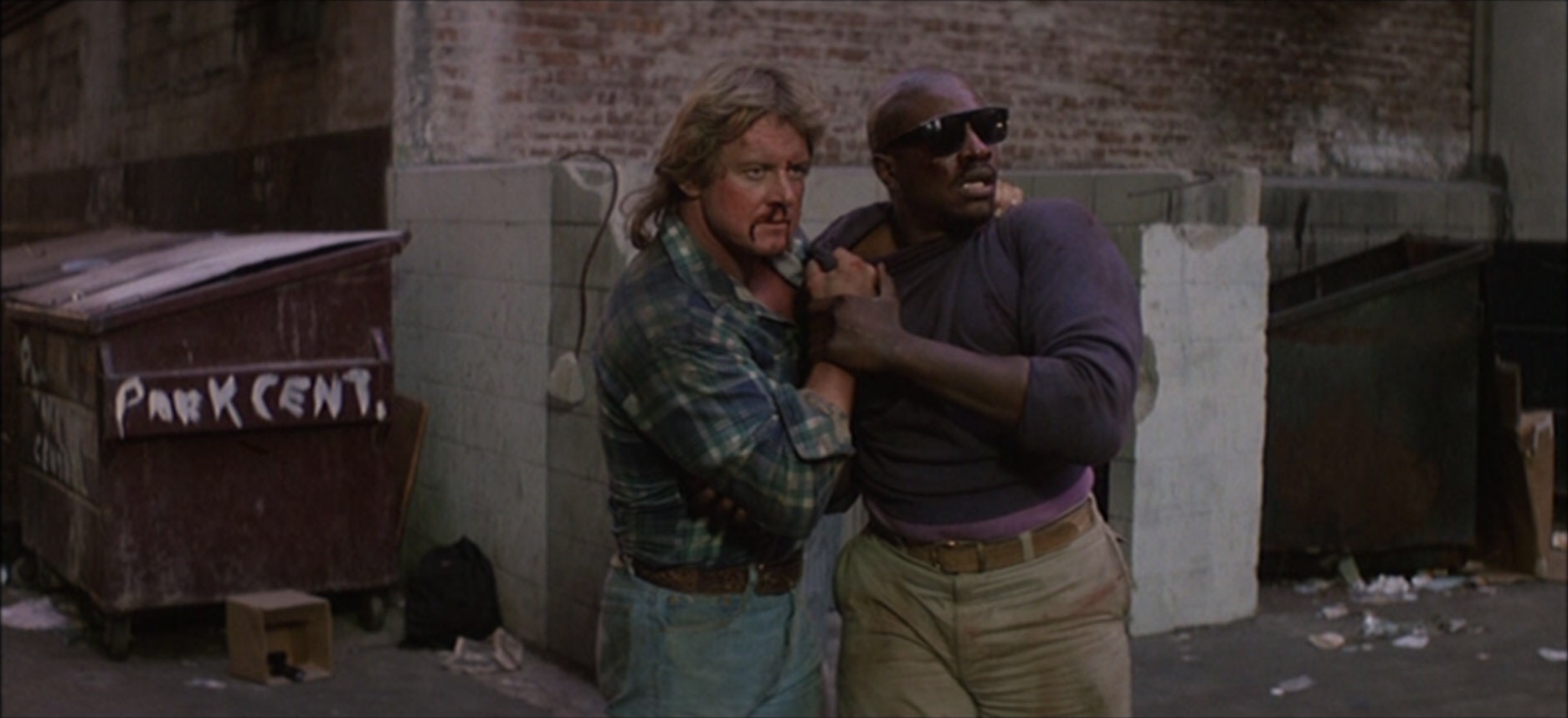 They Live isn’t Carpenter’s best film but what it is is a fun B-movie that dares to be different. Its social commentary and satire give it a much needed layer of added depth and there are several standout scenes that make up for some of its misgivings elsewhere. It’s satisfyingly effective pacing and daring ending will likely shock and satisfy unsuspecting viewers. What Carpenter did with such a meagre budget is to be applauded. They Live is a great little piece of unique and subversive ‘80s science-fiction and a cult classic worthy of such a title. Seek it out, put on some dark glasses and make sure you’ve got plenty of bubblegum.
They Live isn’t Carpenter’s best film but what it is is a fun B-movie that dares to be different. Its social commentary and satire give it a much needed layer of added depth and there are several standout scenes that make up for some of its misgivings elsewhere. It’s satisfyingly effective pacing and daring ending will likely shock and satisfy unsuspecting viewers. What Carpenter did with such a meagre budget is to be applauded. They Live is a great little piece of unique and subversive ‘80s science-fiction and a cult classic worthy of such a title. Seek it out, put on some dark glasses and make sure you’ve got plenty of bubblegum.
Film ‘89 Verdict – 7/10
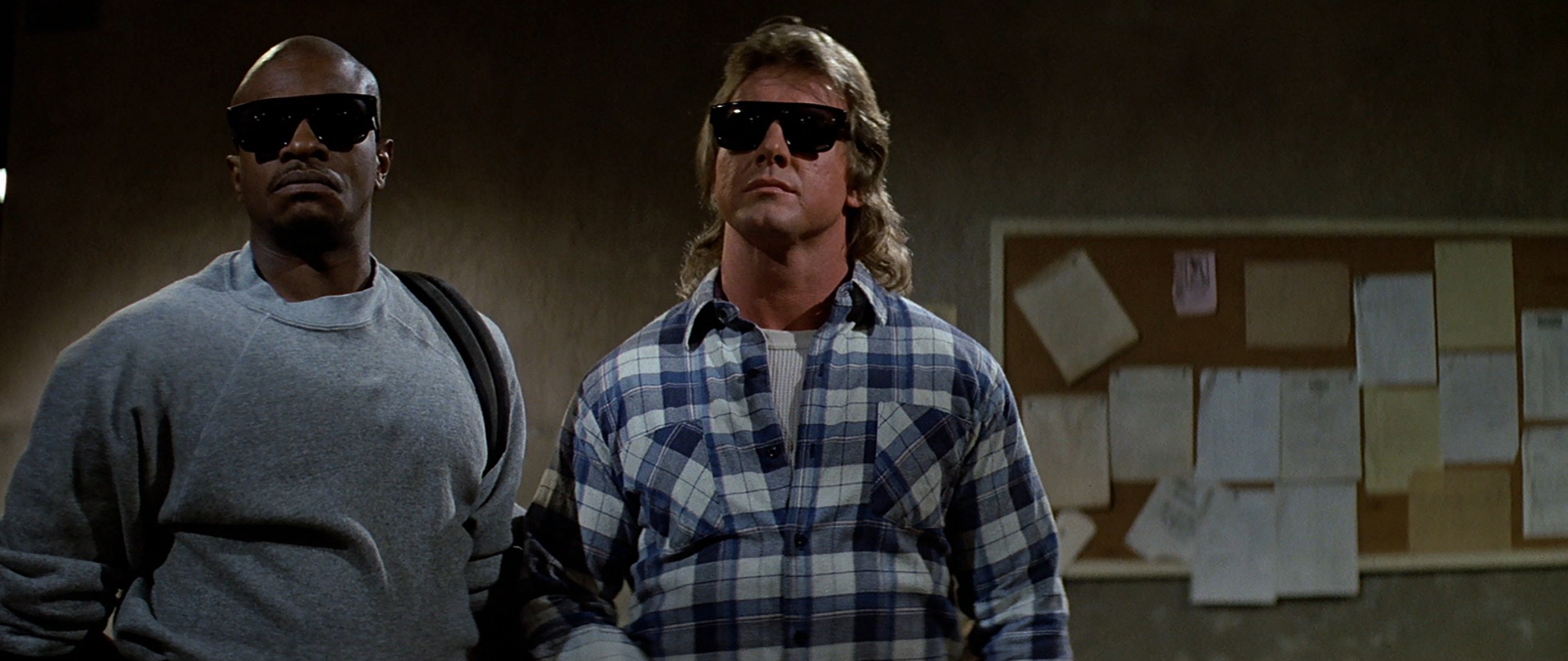
They Live is available on Blu-Ray in the U.K. courtesy of Studio Canal and in the US courtesy of Scream Factory.

